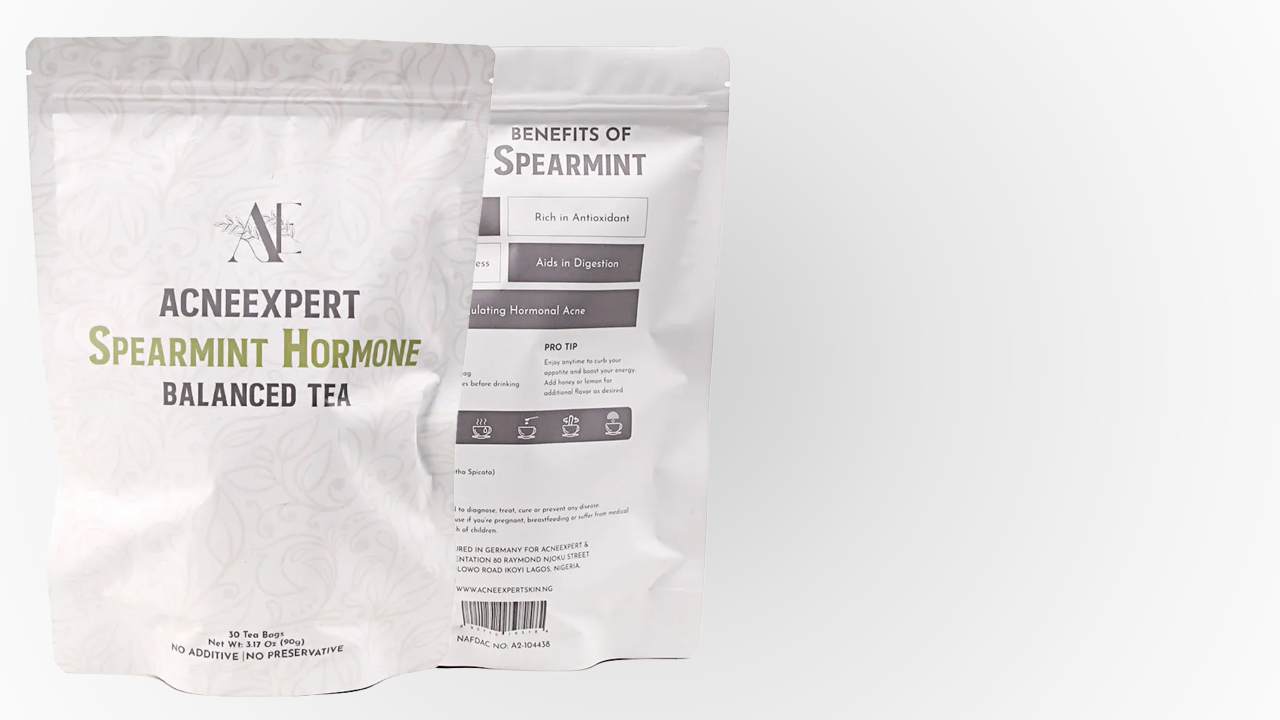Why is spearmint tea good for acne? Acne is a common skin condition that affects millions of people worldwide, often leading to physical discomfort and emotional distress. While various acne treatments exist, many individuals are turning to natural remedies for relief. One such remedy gaining popularity is spearmint tea. This article explores why spearmint tea is considered beneficial for acne, its mechanisms of action, and how it fits into a comprehensive skincare routine.
Key Takeaways: Why Is Spearmint Tea Good For Acne?
Spearmint tea is considered beneficial for acne primarily due to its anti-androgen properties, which help lower levels of androgens like testosterone that can trigger excessive oil production and clogged pores. This is particularly relevant for individuals with hormonal imbalances, such as those with polycystic ovary syndrome (PCOS), where elevated androgen levels are common.
Additionally, spearmint tea possesses anti-inflammatory, antioxidant, and antibacterial properties, which can further alleviate acne symptoms by reducing inflammation and combating acne-causing bacteria. Overall, incorporating spearmint tea into a skincare regimen may support clearer skin, especially when combined with other effective treatments.
Understanding Spearmint Tea
Spearmint tea, derived from the leaves of the Mentha spicata plant, has been consumed for centuries for its refreshing taste and potential health benefits. It is different from peppermint tea, which comes from Mentha × piperita.
Spearmint is known for its aromatic properties and is often used in culinary dishes and herbal remedies.
The Science Behind Why Spearmint Tea Is Good for Acne
1. Anti-Androgen Properties
One of the primary reasons spearmint tea is believed to help with acne is its anti-androgenic effects. Androgens are hormones that can stimulate sebaceous glands, leading to increased oil production and clogged pores.
Research indicates that spearmint tea may help reduce androgen levels in the body, particularly in women with conditions like polycystic ovary syndrome (PCOS) that often lead to hormonal acne.
Furthermore, women who consumed spearmint tea noticed a significant reduction in androgen levels, which correlated with decreased acne severity. This hormonal regulation can be crucial for individuals whose acne is triggered by hormonal fluctuations.
2. Anti-Inflammatory Effects
Inflammation plays a significant role in the development of acne. The redness, swelling, and pain associated with acne lesions are the results of the body’s inflammatory response.
Spearmint tea contains compounds such as rosmarinic acid, known for their anti-inflammatory properties. By reducing inflammation, spearmint tea can help relieve the symptoms of acne, leading to less irritated and clearer skin.
3. Antioxidant and Antibacterial Properties
Spearmint tea is rich in antioxidants, which can help combat oxidative stress in the body. Oxidative stress can damage skin cells and contribute to the formation of acne.
The antioxidants present in spearmint tea, including flavonoids and polyphenols, help neutralize free radicals, promoting overall skin health. Additionally, spearmint has antibacterial properties that can help fight acne-causing bacteria.
Furthermore, testimonies from individuals who consumed spearmint tea suggest a dramatic improvement in hormonal acne after taking 1-2 cups of tea daily.
Overall, by creating an unconducive environment for these bacteria, spearmint tea may reduce the risk of acne flare-ups.
How to Incorporate Spearmint Tea into Your Skincare Routine

It is essential to understand spearmint tea should not be viewed as a standalone solution for acne. Instead, it should be used in addition to an expert-recommended treatment plan.
So, here are some tips on how to effectively incorporate spearmint tea into your routine:
- Drink regularly: Aim to consume 1-2 cups of spearmint tea daily. Consistency is key to experiencing its potential benefits.
- Combine with other treatments: Use spearmint tea alongside other acne treatments, such as topical medications and a proper skincare routine. For example, consider using products that contain salicylic acid or benzoyl peroxide, which are known to be effective against acne.
- Maintain a healthy diet: A balanced diet rich in fruits, vegetables, and omega-3 fatty acids can support skin health. Foods that are anti-inflammatory, such as fish, nuts, and leafy greens, can complement the effects of spearmint tea.
- Consult a Professional: If you have persistent acne, it is crucial to consult a dermatologist. They can provide personalized advice and treatment options tailored to your skin type and condition.
Limitations of Spearmint Tea
While spearmint tea offers several potential benefits for acne, it is essential to approach it with realistic expectations. Drinking spearmint tea alone will not resolve all skincare issues.
Acne is a multifaceted condition caused by various factors, including genetics, diet, and skincare practices. Therefore, a holistic approach that includes professional skincare treatments and lifestyle changes is necessary for optimal results.
Are There Any Known Side Effects of Drinking Spearmint Tea Regularly?
While spearmint tea offers numerous potential benefits, it’s important to be aware of possible side effects, especially when consumed in excess or under certain circumstances:
Potential Side Effects of Spearmint Tea
- Interactions with medications: Spearmint tea may interact negatively with certain medications, including sedatives, drugs that affect the liver, and others. It’s crucial to consult with a healthcare professional before consuming spearmint tea regularly if you are taking any medications.
- Allergic reactions: In rare cases, spearmint tea may cause allergic reactions, such as hives or rashes, in some individuals.
- Pregnancy and breast-feeding: Large amounts of spearmint tea or spearmint oil may be harmful during pregnancy and breastfeeding. It’s best to avoid excessive consumption during these times.
- Underlying Conditions: It is advisable to see a healthcare professional on the appropriate dosage for you if you have underlying health conditions affecting your liver or kidney.
Moderation is Key
Despite these potential side effects, spearmint tea is generally considered safe for most people when consumed in moderation. To minimize risks, it’s recommended to limit intake to 1-2 cups per day for no more than 16 weeks.
If you experience any adverse reactions or have concerns about consuming spearmint tea, it’s always best to consult with a healthcare professional for personalized advice.
Conclusion
Spearmint tea presents a promising natural remedy for acne, primarily due to its anti-androgen, anti-inflammatory, antioxidant, and antibacterial properties. While it can be a valuable addition to an acne management plan, it is essential to recognize that it should not replace traditional skincare treatments. For a holistic approach to achieving clearer skin, consider combining spearmint tea with other effective treatments and maintaining a healthy lifestyle.
For more information on effective acne treatments and skincare tips, visit Acne Expert Skin.
By understanding the potential benefits of spearmint tea and incorporating it wisely into your skincare routine, you can take proactive steps toward achieving healthier, clearer skin.
FAQs
1. How long does it take to see results from drinking spearmint tea for acne?
Results can vary from person to person. Some individuals may notice improvements within a few weeks, while others may take longer. Consistency in consumption is crucial.
2. Are there any side effects of drinking spearmint tea?
Spearmint tea is generally safe for most people. However, excessive consumption may lead to digestive issues or allergic reactions in some individuals. It is advisable to start with moderate amounts and monitor your body’s response.
3. Can men benefit from drinking spearmint tea for acne?
Yes, while spearmint tea is often discussed in the context of hormonal acne in women, men can also benefit from its anti-inflammatory and antibacterial properties. It may help reduce acne severity, particularly if their acne is influenced by hormonal factors.
4. Is spearmint tea effective for all types of acne?
Spearmint tea may be particularly beneficial for hormonal acne but can also help with inflammatory acne due to its anti-inflammatory and antibacterial properties. However, individuals with severe acne should consult a dermatologist for comprehensive treatment options.



